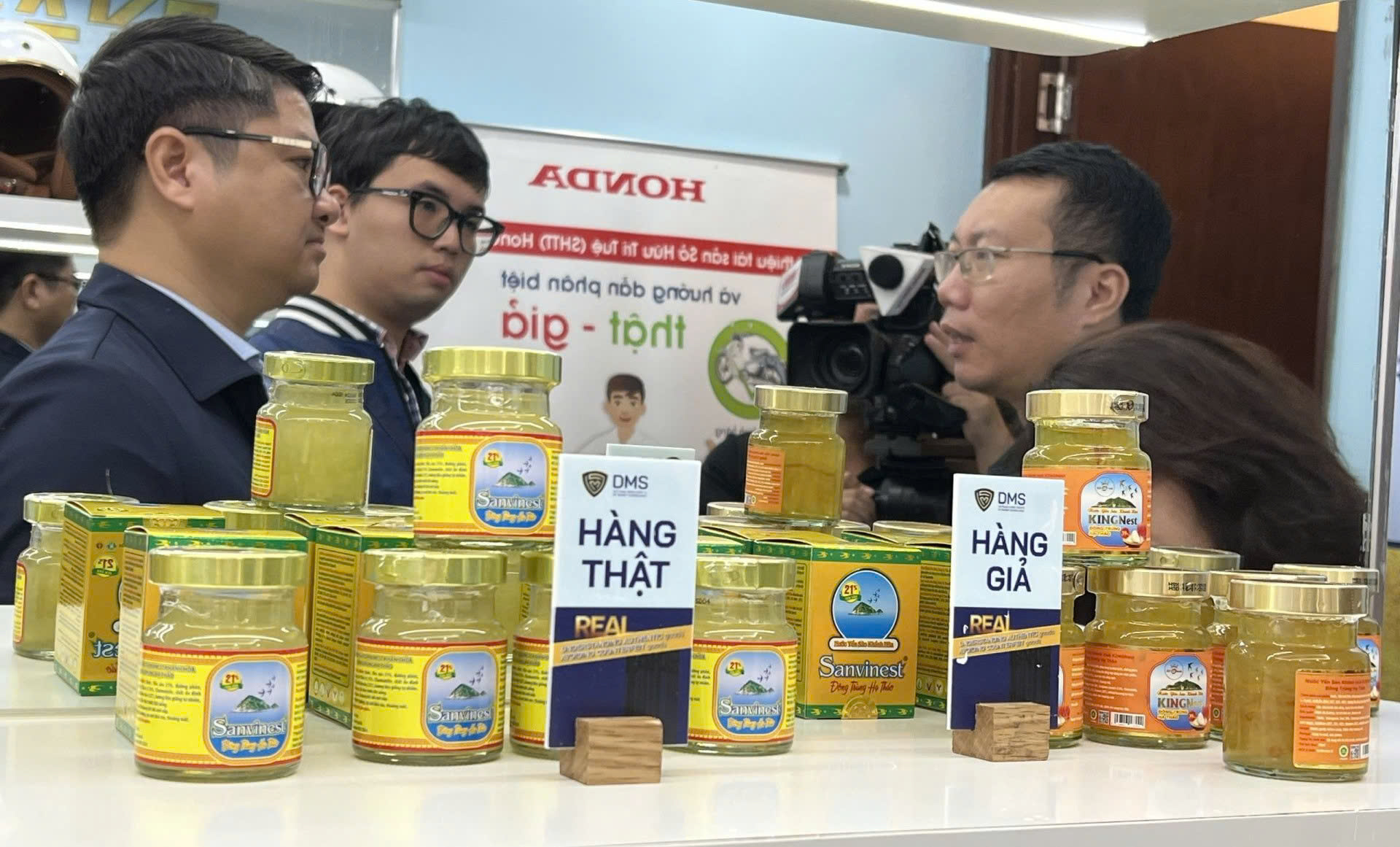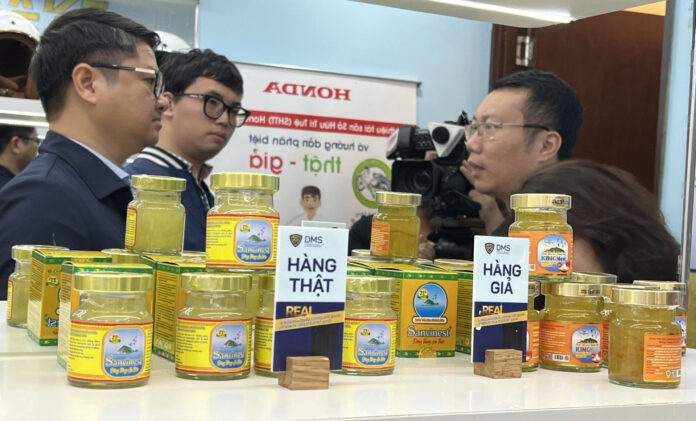The swallow bird’s nest market is in chaos, causing a loss of consumer trust and hindering nest consumption. Recently, the Phu Tho Market Management Force temporarily confiscated over 23,000 suspected low-quality steamed bird’s nest products from Tuan Duong & TKT Bird’s Nest Company in Thanh Son District, causing a stir.
Abnormally low prices
Notably, steamed bird’s nests are widely sold on e-commerce platforms and through live streams by celebrities. A survey of a major e-commerce platform revealed that a store named A.K.S.K. is selling a combo of 20 jars of steamed bird’s nest in five flavors (red apple, lotus, Canadian ginseng, cordyceps, and chia seeds) with a bird’s nest content of up to 35% for only VND 270,000, or VND 13,500 per jar.
On TikTok Shop, bird’s nest jars are commonly priced below VND 20,000 per jar, such as Q.N.S.’s combo of 50 jars of steamed bird’s nest (50%) for over VND 700,000.
However, this product is facing challenges on live streams due to recent quality scandals. An influential consumer on social media (KOC) stated that steamed bird’s nests are a very sensitive product on social media, and live streams often receive negative comments. Therefore, KOLs/KOCs are cautious about selling bird’s nest products, even with introductions from government agencies. “A brand introduced a product that claimed to contain seaweed, but the label did not mention it, raising questions among consumers,” the KOC said.
Mr. Nguyen Thanh Hai, CEO of Khanh Hoa Bird’s Nest Company, remarked that social media platforms and e-commerce sites are being exploited to sell products labeled as “bird’s nest water” and “pure bird’s nest” at abnormally low prices. Due to loose seller verification, many consumers have purchased counterfeit products with no nutritional value.
Moreover, the preference for cheap products poses health risks as the retail price of VND 9,000–15,000 per jar is completely disproportionate to the actual value of bird’s nests. Substitute ingredients such as gelatin, artificial sweeteners, and flavor enhancers can have serious health consequences, especially for children and the elderly, who are often the preferred consumers of bird’s nest products.
Mr. Hai also mentioned that his company recently discovered over 30 units illegally copying the trademarks, packaging, and product information of Khanh Hoa Bird’s Nest (Sanvinest, Sanest), confusing consumers. Despite filing complaints with the National Office of Intellectual Property and relevant authorities, the penalties have not been deterrent enough. Therefore, the company has intensified market inspections, collaborated on handling violative websites, and strengthened communication to guide consumers in identifying genuine products. The Khanh Hoa Bird’s Nest trademark has been exclusively protected, providing a strong legal basis against counterfeiting.
According to surveys, raw bird’s nest prices, despite being at their lowest in a decade, still range from VND 14–15 million per kilogram, making it challenging to include a high proportion in products while maintaining low prices. Ms. My Trinh, representative of Minh Luan Bird’s Nest business household in Can Gio, Ho Chi Minh City, stated that there is currently no basis for calculating the percentage composition of bird’s nest. Therefore, Minh Luan Bird’s Nest chooses to indicate the weight of 1.5 g/70 ml based on the production process of weighing cleaned and refined bird’s nest (dry form). Currently, their steamed bird’s nest jars are sold for about VND 65,000 each.

Display of genuine and fake bird’s nest drinks at the exhibition of the Market Management Department – Photo: Ky Nam
Consumer trust erosion
Ms. Ly Hua Thi Lan Phuong, CEO of Bay Nui Bird’s Nest Company in An Giang, also commented that the bird’s nest market is currently in disarray, eroding consumer trust and making it challenging for the bird’s nest farming industry to find buyers. Ms. Phuong cited surprising data showing that most bird’s nests come from Malaysia and Indonesia and are imported in large quantities to Vietnam, including many types that do not meet China’s import standards. “In the first eight months of 2024, bird’s nest imports reached 460 tons, double the volume for the whole of 2023, while domestic bird’s nest production is only about 200 tons per year. This indicates a significant domestic market potential,” she said.
Mr. Nguyen Hoang Tuan, owner of over 20 bird’s nest houses in Ho Chi Minh City, Long An, Soc Trang, and Ca Mau, also acknowledged that genuine and high-quality bird’s nests are currently difficult to sell due to their high prices. Specifically, raw bird’s nest prices at these houses range from VND 20–25 million per kilogram, and cleaned bird’s nest prices start at VND 30–40 million per kilogram, even reaching VND 65 million per kilogram. In contrast, low-quality bird’s nests are priced at only VND 15–17 million per kilogram and are selling well. “Our nests are struggling to compete in the market, and our sales have dropped by more than 50% compared to previous years,” Mr. Tuan said.
Mr. Tuan also mentioned that Malaysia’s bird’s nest production is 50%–60% higher than Vietnam’s, while Indonesia’s is five times larger. Still, their quality is inferior because they use industrial farming methods, feeding birds with animal feed. In contrast, Vietnamese bird’s nests are natural and have a higher nutritional value. “They export their best nests to China, while the inferior nests, debris, and even nest foundations, which have no nutritional value, are bought by traders and imported to Vietnam in large quantities at a price of about VND 8 million per kilogram. These nests are then sold in the Vietnamese market at double the purchase price,” Mr. Tuan explained.
Faced with this situation, the Vietnam Bird’s Nest Association sent documents to various management agencies, including the Ministry of Agriculture and Environment, the Ministry of Industry and Trade, the Ministry of Health, and the Ministry of Public Security, reflecting and proposing recommendations related to the management of the bird’s nest market to protect consumers’ health and rights and contribute to the sustainable development of Vietnam’s bird’s nest industry.
According to feedback from members of the Vietnam Bird’s Nest Association and enterprises, the bird’s nest industry still faces issues with product quality, including nutritional content, food safety indicators (such as nitrites), and unclear origins.
“How Can Authentic Vietnamese Products Rise Above the Scourge of Counterfeits?”
“In addition to encouraging honest businesses and investing in quality, it is imperative to take a firm stance against deceptive practices, counterfeit goods, and substandard products. By restoring trust and making ethical values the market norm, Vietnamese goods can truly thrive, not just domestically but also in the international arena.”








































